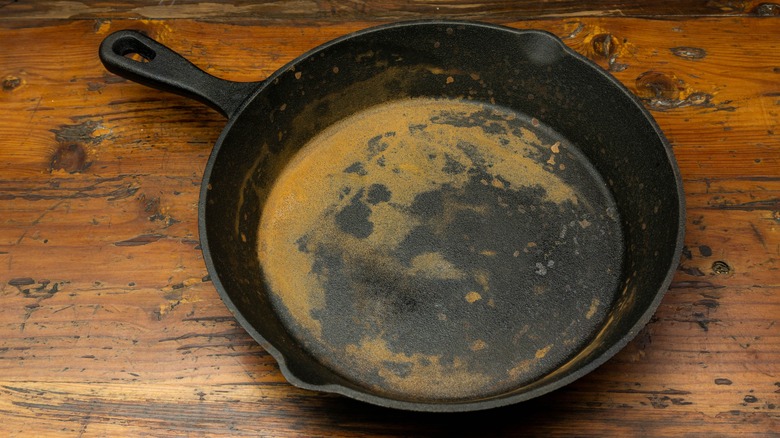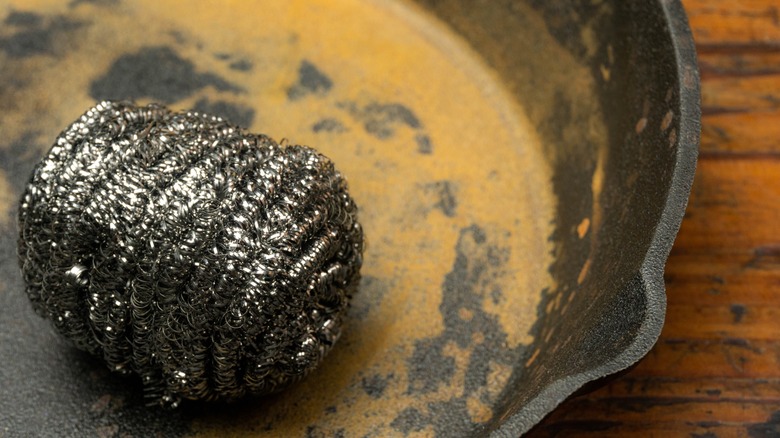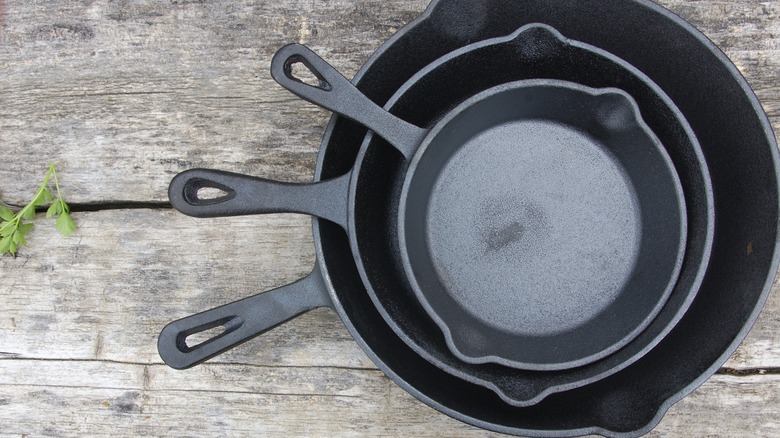The Pantry Staple That Easily Cleans Rust From Cast Iron Skillets
Believe it or not, a layer of rust does not mean the end of the road for a cast iron skillet. Cast iron is known for its durability and can last for years, making it a lifelong friend that can even be passed down as a prized family heirloom. It is strong, sturdy, and can withstand more than you think. So no matter how stubborn that rust looks, know that you can almost always restore a cast iron skillet back to its original glory. In fact, it doesn't even require a lot of work. In most cases, all you need are two pantry staples: lemon and some kosher salt.
The acid present in the citrus slackens the rust as the coarse flakes of kosher salt work as a mild abrasive scrub. Together, they can get that coppery orange layer off within minutes. To use them, begin by slicing the lemon in half and then dip it in the salt. Scour the pan with the salted lemon until the rust begins to wear off. You can even sprinkle in more salt if you think the pan needs extra help. Rinse it with soap (yes, you can clean cast iron skillets with soap) and water at the end, and your cast iron skillet will look as good as new. Just watch your clothes and those shiny countertops while you're cleaning — rust has a knack for staining everything it touches.
Other ways to clean rusty cast iron skillets
While lemon and kosher salt are one way to clean rusty cast iron cookware, just a steel wool pad can also get the job done. Use it the same way as the citrus fruit to scrub the pan, and then follow it with a soap water rinse before drying it thoroughly. These methods are excellent for light rusting, but if your skillet has a thicker, more stubborn coppery layer, you may need a stronger solution.
In that case, consider soaking the cast iron in some vinegar. Dilute distilled white vinegar with equal parts water and submerge the pan in the solution until all the rust melts away. This can take anywhere between one to eight hours, so make sure to keep an eye on the skillet throughout. The acetic acid present inside vinegar can easily dissolve rust, but if you oversoak it, it will start corroding the actual cast iron pan too. Sadly, this is one of the rare instances where the damage is irreversible, so always be cautious when using vinegar.
There's baking soda too — the trusty ol' powder that's one of the best ways to naturally clean your kitchen. Sprinkle it onto the skillet or turn it into a paste with the help of lemon juice. Smear the paste onto the skillet and let it sit for at least a day before you scrub it off.
How to keep your cast iron cookware rust-free
There are several reasons why your cast iron cookware might be sticky, rusty, and a little worse for wear. Cast iron is a porous material, and rust is essentially the result of it being exposed to oxygen or moisture and oxidizing. To save yourself the trouble of scrubbing that layer, always keep your cast iron cookware away from any trace of water. Don't ever soak it in water (unless you're cleaning the rust in vinegar and water) and dry it with a towel as soon as you're done cleaning it. Cast iron isn't meant for dishwashers either — always hand wash it, using the help of gentle soap if you need it. Store the skillet in a cool and dry place, away from humidity.
Cast iron is also more likely to rust when the slick layer of seasoning is missing or wearing off. Keep the skillet well-seasoned at all times and avoid cooking acidic things in it that can compromise the protective coating. This is why it's best to not stack cast iron when you're storing it either: Doing so can cause chinks in the seasoning, exposing the cookware to nasty rust. It's also important to re-season the skillet once you're done removing the rust. The thorough scrubbing will have gotten rid of all the non-stick coating, so you'll have to season the rust-free cast iron skillet with oil and bake it again.



